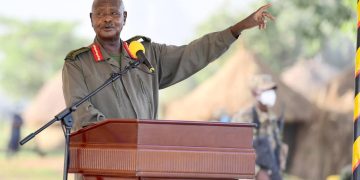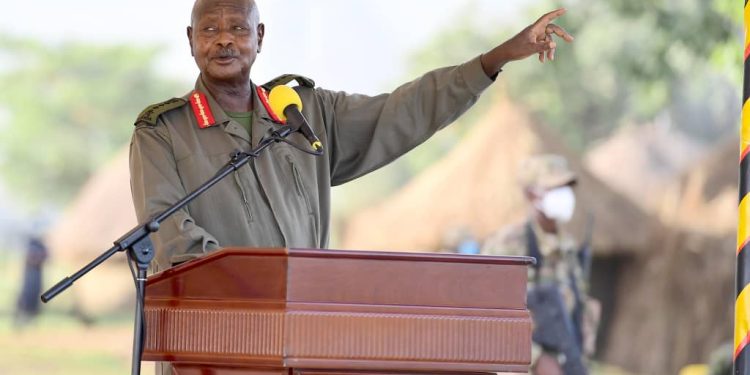President Museveni has called on leaders to fight corruption so that the development of infrastructure can blossom.
The Commander in Chief of the UPDF was Tuesday passing out 2593 Local Defence Personnel at Olilim Training School, Palam Sub County, Ngariam County in Katakwi District.
“The old armies had a few training schools like Jinja, Kabamba and Nakasongola but now we have Singo, Kaweweta which have a special history. Others like Labwordwong and Butiaba, among others, were identified by the army leadership,” he noted.
 The president invited the press to take pictures of the simple huts in which the soon to be passed out soldiers used to sleep.
The president invited the press to take pictures of the simple huts in which the soon to be passed out soldiers used to sleep.
He said this was an indicator to show the parasites in Kampala (Bamulyabiyidde) that one can begin humbly within their means and serve their people.
“All these leaders who don’t see that you need to live humbly in order to serve your people are really parasites and should be rejected. UPDF is an example that works with little resources but provides service for the people,” Museveni said.
He expressed happiness at the fact that the recruits are well educated with degrees, A-Level and the lowest with UCE certificates.
“Educated people are easy to train because they learn quickly,” he added.
President Museveni promised to eliminate cattle rustling and called on cattle rustlers to stop the vice because they are wasting their time.
“Cattle rustlers are sabotaging themselves – money we would use to develop them as we have done with the Soroti – Moroto-Kotido road and a power line, is instead used to fight them,” he scoffed.
The trainees were voluntarily recruited from the districts of Kampala, Wakiso, Greater Mukono, the Greater Jinja and the Greater Iganga with qualifications ranging from Uganda Certificate of Education (UCE) to Masters Degrees in various disciplines.
During the course, the graduates acquired basic military skills and knowledge, several tactical field training exercises and drills.
They also received external lecturers from Senior Military and Government officials to familiarise them with current political trends and leadership at different levels.









